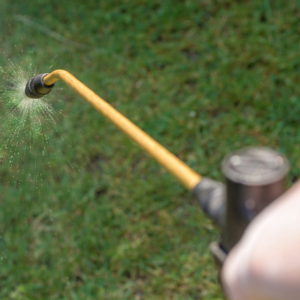[et_pb_section fb_built=”1″ _builder_version=”4.16″ custom_padding=”6px|0px|54px|0px|false|false” global_colors_info=”{}”][et_pb_row _builder_version=”4.16″ background_size=”initial” background_position=”top_left” background_repeat=”repeat” custom_padding=”27px|0px|27px|0|false|false” global_colors_info=”{}”][et_pb_column type=”4_4″ _builder_version=”4.16″ custom_padding=”|||” global_colors_info=”{}” custom_padding__hover=”|||”][et_pb_text _builder_version=”4.17.6″ header_4_text_align=”right” background_size=”initial” background_position=”top_left” background_repeat=”repeat” hover_enabled=”0″ inline_fonts=”Verdana” global_colors_info=”{}” sticky_enabled=”0″]
Pest infestations are very damaging to the health of your landscape. Countless insects make their home on grass, and many will do serious harm. Commercial landscape pest management is essential for sustaining a healthy property.
Part of that management includes pesticides which will provide effective solutions for your commercial landscape. They are necessary for your landscaping needs, but it’s important to know which ones and how to use them to create a layer of protection for your property. This blog will focus on the pesticides used to protect grass and plants.
What are pesticides exactly?
Pesticides manage any destructive pest issues on grass or plants. “Pests” are any animal or plant which harms humans, food or living situations.” Fungi, plants, and different intrusive animals are all included in this category.
 Different Types of Pesticides
Different Types of Pesticides
Knowing which pesticides to use for your property’s unique situation is the first step. Along with understanding how to safely apply pesticides is crucial.
Insecticides are used to control insects and rid your property of invasive insects, and one such pest are Grubs. Grubs destroy the root system just below the soil. They are widespread and will impact a landscape’s aesthetic and health. You will know that your turf has a pest issue if the lawn has a dried-out look or dead and dying brown grass patches.
Insecticides control insects through various means of a chemical process. Some products focus on the insect’s nervous system, while others affect the insect’s development process. It is imperative to handle insecticides responsibly for safety and the best outcomes.
Failure to follow the proper instructions to apply will cause possible endangerment to humans, animals, and the environment at large.
Fungicides will kill or control the development of fungi and spores. Fungi include yeasts, rusts, smuts, mildews, molds, and mushrooms. Fungicides function in various ways, but many sabotage the cell membranes or hamper the energy development in the fungal cells, eliminating their growth.
Fungi can cause numerous illnesses to humans, along with infecting a landscape with diseases to cause damaging patches of brown or yellow grass.
Diseases attributed to fungi:
-
- Anthracnose
- Snow Molds
- Stem, crown, and root rot
- Dollar Spot
- Necrotic Ring Spot
- Brown Patch
- Powdery Mildew
- Leaf Spots & Blights
- Root rot
- Summer Patch
Fungicides combat many lawn fungi and plant fungus species. The Fungicide Resistance Action Committee, FRAC, assigns a code to fungicides based on their active ingredients to help reduce cross-resistance. When selecting fungicides for your landscape, it’s essential to establish a fungicide resistance program with different FRAC codes. Cross-resistance occurs when a fungus becomes resistant to a particular fungicide, leading to its resistance to another fungicide with the same target site.
Every property is unique, so it is necessary to utilize the expertise of professional landscapers. Having a beautiful commercial landscape may seem like a task, but the right landscaper will have the knowledge to combat any pest issue you may have.
We hope these tips about pesticides have been helpful. If your landscaper is not performing these tasks, it is time to switch to a professional commercial landscaper. Please consider JBa Land Management. We service all-size commercial landscapes in the Dallas-Ft Worth – Metroplex. Give us a call at (214) 660-1500 and receive a free quote for your property.
[/et_pb_text][/et_pb_column][/et_pb_row][/et_pb_section]

